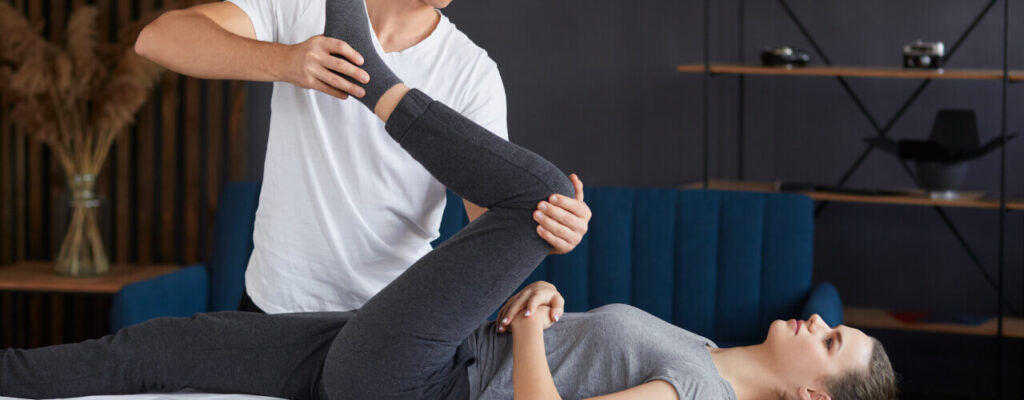Find Relief for Your Hip and Knee Pain with Our Physiotherapists Today

If you’ve been dealing with hip and knee pain for a long time, you may believe it’s permanent. After all, can you really get long-term relief from severe joint pain?
You can, in fact, and physiotherapy is one of the best ways to do so! With the right physiotherapy treatments, you can alleviate pain in your hips and knees and possibly even eliminate it entirely.
To learn more about how physiotherapy can help relieve your hip and knee pain, contact (Practice Name) in (Town) today.
What is the root of my hip or knee pain?
Hip and knee pain can be caused by a great number of problems. Some of these are related to musculoskeletal misalignment, poor posture, and/or excess weight; others occur as the result of natural aging or unhealthy sports/work habits. Your hip or knee pain may stem from:
- Traumatic injuries, such as dislocation of the joint
- Postural/alignment issues that throw your body off balance, straining the knees or hips
- Runner’s knee, an instability of the kneecap
- Osteoarthritis, a painful inflammatory condition involving deteriorated joint cartilage
- Tendinitis, or stretched ligaments
- Bursitis, an inflammation of the friction-reducing sacs surround the joints
- Infections
Our physiotherapist can often tell the cause of your hip or knee pain from its location. For example, pain along the inside of the hip is more likely to be caused by a problem with the bones or cartilage. Pain along the outer side is typically caused by a problem in the muscles, tendons or ligaments.
Discover other causes of hip and knee pain below:
- Hip Pain – Hip pain can be caused by a variety of medical conditions as well as from certain injuries. Inflamed tendons from over-exertion or an athletic injury can cause temporary or chronic hip pain. Tendinitis, dislocation, sprains, and pinched nerves can all contribute to or be the cause of hip pain. Hip pain may also result from repetitive injuries or poor posture.
- Knee Pain – Injuries that include torn cartilage or damaged ligaments can cause knee pain. Fractures, tendinitis, and knee bursitis are all common knee injuries. Medical conditions such as arthritis or gout can cause mild to severe knee pain. You may be experiencing stiffness or swelling in one or both knees. It might be difficult to stand, walk, or fully straighten your knee. Sometimes knees will make popping or crunching noises.
How can physiotherapy help relieve my pain?
Hip and knee pain can be extremely frustrating because it appears that no matter what you do, if you move, you will experience pain. However, there are ways to reduce your pain in the long run.
It may take some time and effort on your part, but physiotherapy has been shown time and again to help patients of all ages and backgrounds reduce hip and knee pain.
Why does physiotherapy provide such long-lasting pain relief? There are several reasons for this, including:
- Helping you live a healthy and active life. Chronic hip and knee pain can be improved significantly through regular exercise and a healthy lifestyle. Of course, you have to be able to move without significant pain to exercise – something that is made much easier by physiotherapy. Your physiotherapist can help you improve your hip and knee pain significantly and teach you ways to exercise so that you avoid injuring your joints. Through physiotherapy, you can regain strength and mobility so that you can lead a more active lifestyle.
- Discovering how to move in the proper ways. Many times the pain you are experiencing in your hip and knee is related to unhealthy movement patterns. They may have been learned over time or in response to an initial injury. Those unhealthy movements cause added strain on your joints and lead to further pain and injuries. Your physiotherapist will help identify unhealthy movement patterns and give you advice to replace those patterns with ones that will protect your joints from further injury.
- Preventing future injuries. One of the big frustrations with joint pain is that it never seems to fully go away. Even if you rest for a while and feel better, when you go out and start moving again the injury can flare up all over again. But with physiotherapy exercises, you get much stronger than you were before. The added strength allows your muscles to better support your joints, so you are less likely to experience additional irritation in the joint.
- Treating your problem at its root. If you just treat the symptoms of a hip and/or knee issue, you are almost guaranteed to see the problem pop up again later on. But if you can identify the source of the problem, you can actually treat what is causing the pain. Physiotherapists have a process to identify the causes of hip and knee pain so that they can give you targeted treatments designed to get to the bottom of what is causing your pain.
Are you ready to find relief?
If you are experiencing hip or knee pain, we want you to know that we are here to help. Our (town) physiotherapy team can help you reduce your pain and live a healthier life.
Make an appointment with (Practice Name) today to get the relief you deserve!
